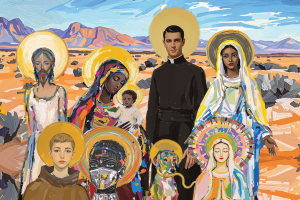On vacation last summer, I quietly joined a small country parish for Sunday Eucharist. Relieved at not having to preside at two or three liturgies, I settled among the worshipers, looking forward to listening, singing, and praying. Trying not to look directly at the priest for fear he would think I was staring, I concentrated on being among God's people, not leading them.
Everything went fine for a while. The music was delightful, the lectors read well, and the priest seemed comfortable in his role. Then he began to preach about "cafeteria Catholics," people who pick and choose what and how they will believe-as they do in cafeteria lines. He suggested real Catholics take it all. They listen to the pope and bishops with the same reverence children offer their parents and accept Rome's authority as binding in matters great and small.
I listened closely for a while, then my mind and spirit began to drift. Hasn't the church consistently encouraged Catholics to recognize a hierarchy of truths, challenging us to differentiate between foundational gospel values like service among the poor from a less important teaching like the existence of limbo? By this time, it was getting hot in that little church, and I wanted to be back in my boat fishing.
But the priest wouldn't quit. I kept telling myself that he was having a bad day. All of us do. Smiling I began to think about the times I was preaching and simply couldn't find a way to end, even though I tried several times. Then, he said it again: "Cafeteria Catholics, unless they are willing to submit to church authority blindly, have no place in the church." Using my 12-step spirituality, I repeated a familiar axiom to myself: take what you like and leave the rest.
Oh my God, I thought, he's talking about me.Taking what I like and leaving the rest makes me a cafeteria Catholic. Unable to listen any longer, especially to what sounded like an angry and harsh tone, I was doing exactly what he was railing against: picking and choosing what I liked and shutting out the rest. But doesn't everyone do this, I asked myself? Don't Catholics everywhere have a right to resist abuse in all forms, even when it comes from the pulpit? Shouldn't people stop listening to me when I get pompous and judgmental as a presider or a preacher?
Without realizing it, I was getting defensive, wondering whether I should introduce myself after Mass and ask the presider whether I had heard him right, offering him an opportunity to go beyond what I thought he said. Thank God, I came to my senses. You're on vacation, I told myself. Calm down, pray, and do what Catholics everywhere do with increasing regularity: listen politely, and go home. Still, as I stepped into my little boat and rowed myself onto the lake where I hoped to catch a giant bass, the need to defend cafeteria Catholics wouldn't go away.
Now I know that cafeterias get very little respect among sophisticated gourmets. Although they sometimes eat in them because they're rushed, they don't want to dignify them by calling them restaurants. One step up from fast-food joints, cafeterias usually have a long line of vegetables, meats, and salads-none of which seem very appealing. Cafeterias do have a dark side, I have to admit.
At the same time, although often very big and poorly decorated, cafeterias welcome everyone, charge very little for their food, and provide a safe place for people to rest and conversation. The poor, the elderly, the homeless, even large families with small children, all know they can gather there without fear of being evicted. Sounds a lot like many good parishes I know!
Perhaps even more important, it seems to me that the church has been like a cafeteria for 2,000 years. Haven't we always at our best, appreciated our differences without expecting everyone to be the same? We honor Eastern Rite Catholics, whose liturgy and language are so different from ours, and Japanese Catholics, who enter their churches shoeless. We welcome peoples of every culture, race, and political affiliation, and we are even beginning to understand that the sacred stories of the poor are a privileged source of hope and help us understand the Christ who "had no place to lay his head."
We also reverence bishops who tell us that capital punishment is always unjust and a pope who leaves open the door to taking another's life only in very extraordinary circumstances. We acknowledge that some people like me are called to follow the poor Christ as Franciscans, and others are supposed to build Benedictine monasteries. In other words, we implicitly admit that our goal is not uniformity of belief and practice but unity of faith.
At our best, we stand in awe at the doors of our churches contemplating our incredible diversity, never expecting to understand or fully appreciate all the people with whom we gather. And because we recognize the complexity of all our lives, we are grateful to share faith and worship with one another despite the realization that we will have differences of opinions about many significant religious matters. More important, our collective humanity never tries to reduce the mystery of our shared faith to rigid formulas but celebrates the wonder of our unity in the midst of our differences.
Even a cursory glance through history reminds us that Catholics have always had a cafeteria mentality. We have been fighting like cats and dogs about our differences for centuries, from the meaning of the Incarnation to women's ordination and how Christ is present in the Eucharist.
Despite these sometimes violent struggles about which we often fail to reach full understanding or agreement, we continue to call one another, brother and sister, Catholics.
Last year I was giving a talk at a religious education conference and learned this lesson first hand. Hoping to help catechists understand and appreciate the power and value of our sacred symbols, I asked people what they thought the important gestures of our eucharistic celebration were. One woman eagerly waved her hand. Before I could even recognize her, she blurted out: "When the priest raises the host for our adoration." "Thanks," I said, "A good answer. Someone else?" "When we open our hands to receive the host," another participant suggested. "Right," I said, "anyone else?" hoping that someone would mention the fractioning or breaking of the bread, a gesture that helps us remember that Christ broke his life for us as food and asks us to do the same for one another.
Instead of an answer, someone almost shouted a question. "Do you believe in transubstantiation?" Hesitating for a moment, I responded, "That's a very difficult question. Perhaps we could talk about it after the workshop."
The response was swift. The Catechism believes in transubstantiation. I knew I was trapped. How could I explain, without upsetting the questioner even more, that Catholics believe in the Real Presence of Christ and that transubstantiation is the way theologians have often explained the Real Presence. Flustered now, I suggested again that we needed to speak about the question after the conference.
Then a teenager rescued me. "I'm lost" she said. "I'm not sure it's important, but what's transubstantiation?" Everyone laughed except the person who wanted me to believe in transubstantiation. The young girl's question reminded everyone that we really are diverse. Not only did she not know what transubstantiation was, our further conversation demonstrated that she really didn't care.
"I know we receive Jesus when we celebrate the Eucharist," she said, "and as long as the children preparing for First Communion know that, I'm happy." Somehow she knew that whether she explained Christ's presence using the notion of transubstantiation or some other explanation, the key to belief was not theological insight but acceptance of the mystery of Christ's presence.
The Catechism of the Catholic Church also helps us learn about the power and value of diversity in the church. While reminding us of our sometimes violent history (#817), it challenges us to delve more deeply into the mystery of faith, acknowledging the simple sanity of proclaiming our unity without demanding uniformity (#819). Nowhere is this clearer than when the catechism reminds us that "the body's unity does not do away with the diversity of its members; `In the building up of Christ's body there is engaged a diversity of members and functions. There is only one spirit who, according to his own richness and the needs of the ministries, gives different gifts for the welfare of the whole church'" (#791).
In other words, all of us have different gifts that are intended to work together for the good of all. It is not necessary that we compare gifts or have them all to be good Catholics. Neither is it essential that we have absolute agreement about everything the church teaches. While it is undeniable that we need to agree in faith about foundational teachings like the Incarnation, the Trinity, and our shared commitment to justice, there is enormous room for dialogue about how Christ is truly God and human, how God is three persons but only one God, and how best to work for justice. In the end, whenever we forget that we are trying to help people understand, appreciate, and believe in the mystery of God's presence within and among us, we not only add to an unhealthy division in the church, we also risk reducing God to our own constructs. When we do that, we can easily fall into idolatry.
Many adult cafeteria Catholics not only tolerate diversity in the church, they celebrate it. They choose a variety of paths to personal holiness, are excited by the insights of other religious traditions; they not only appreciate the development of doctrine through the centuries, they expect it to continue. Grounded in compassion and never forgetting where they come from, cafeteria Catholics honor other Catholics who can't stand music at Mass, esteem their neighbors who serve on parish councils, and listen politely to poorly crafted homilies because they respect the office of their priests if not their speaking ability. They try never to judge others who think differently from them and listen carefully to all with the expectation that there is much to learn about what it means to be Catholic now and in the future. And together with those with whom they often disagree, they volunteer in soup kitchens and homeless shelters week after week.
While cafeteria Catholics have received very bad press in recent years, often being condemned for actions they never even contemplated, they continue-struggling to understand and appreciate the most important and foundational teachings of the church. My experience tells me they are a community of searchers who are proud to call themselves Catholic while freely admitting they are sifting through the vast array of church teaching, trying to discern what most helps them on their own faith journeys. Humbled by their honesty and empowered by their passion, I am proud to join them in the search.











Add comment